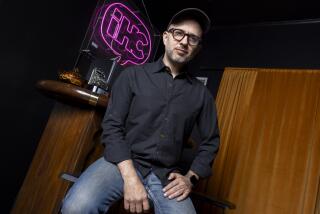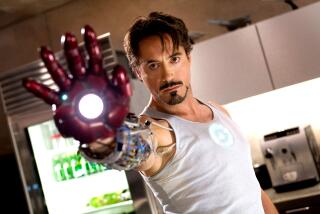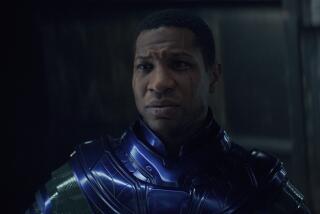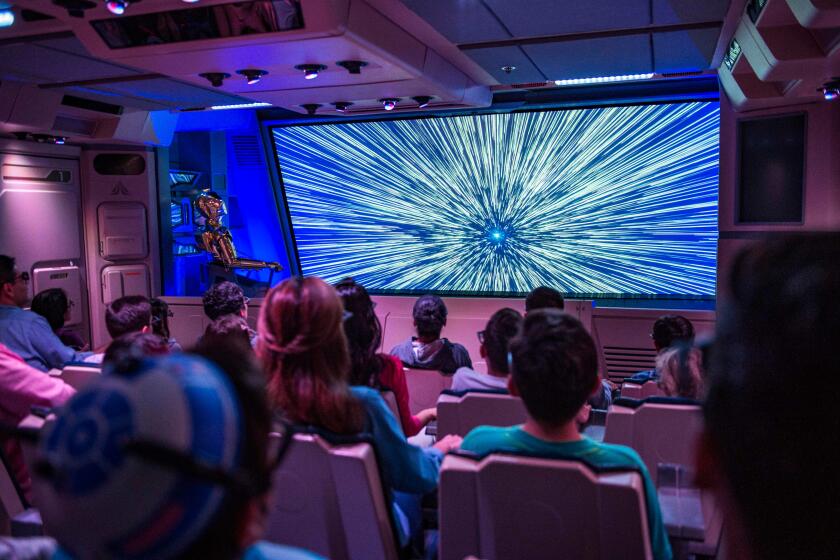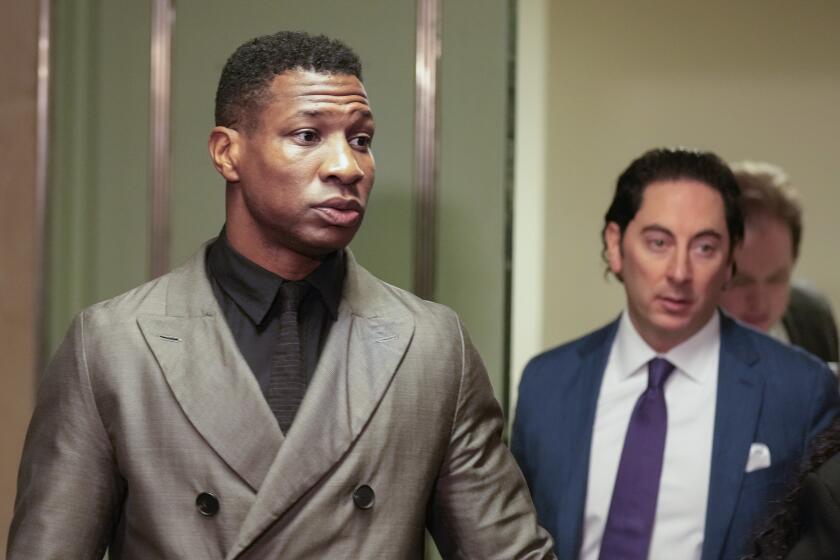Why Captain America’s keepers, the Russo brothers, are turning to China for inspiration
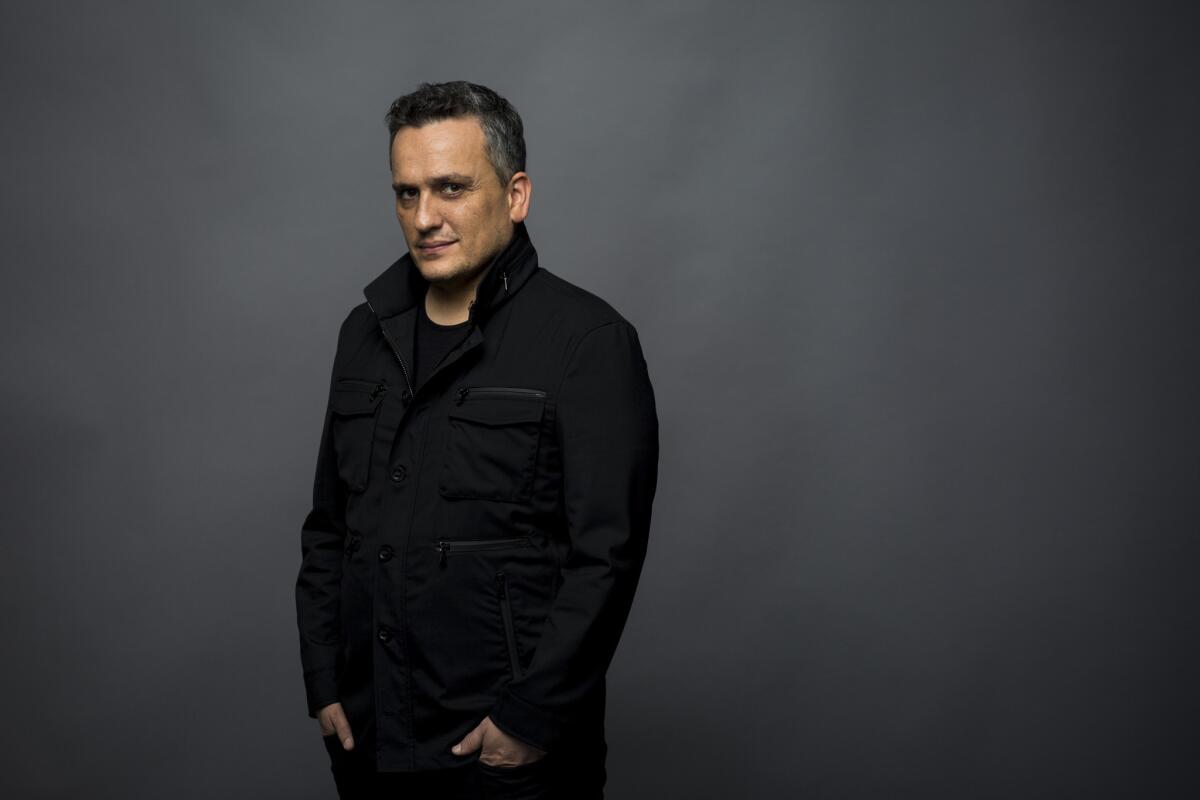
Joe Russo, co-director of Marvel’s “Captain America: Civil War.”
Where is the directing duo behind “Captain America: Winter Soldier” and “Captain America: Civil War” looking for inspiration these days? The answer may surprise you: China.
Joe and Anthony Russo’s latest installment in the Marvel franchise will charge into mainland theaters May 6 – a simultaneous release with its U.S. opening. Joe Russo was in China last week to promote the tentpole and work on finding new projects for Anthem Pictures, the brothers’ new venture dedicated to creating Chinese-language films for release in China. Hero Complex caught up with co-director Russo to talk about the six-week-old company, his obsession with Chinese food, and growing interest in the Middle Kingdom. Following is an edited transcript.
Why China?
Joe Russo: The U.S. market is becoming stagnant. It’s very hermetic. It’s about tentpole films, and there’s no independent scene anymore. Anything that was independent is now in television. So TV has really do-si-do’ed with the movies and I think the most interesting content being made is in television -- the more adventurous, character- driven content. As filmmakers we are interested in unique voices.
When we came here to promote “Winter Soldier” [in 2014] we fell in love with the country. Because I’m Italian, I have a real love affair with food, and the way I relate to a culture is through the food. And I fell in love with the food here. I think Beijing is incredibly dynamic, a very unique city.
We just started watching Chinese films and there were some directors that we loved, like Jiang Wen (“Let the Bullets Fly”), Ning Hao, who did a movie called “Breakup Buddies,” and Wuershan (“Painted Skin: The Resurrection”), who’s doing these big visual spectacles. There’s so much happening here and it’s such an interesting market.
We grew up near a cinematheque in Cleveland, so we were very influenced by international cinema, the French New Wave, Italian neo-realists. It’s been a long time since there’s been an emerging market that can challenge the U.S. market. So I think this is a really exciting time, because the more diversity we have in cinema, the more interesting it becomes. So I think anything we can do to help cultivate the market here or try to inspire with our level of experience or be inspired by the market, we’re willing to do.
You’re bored?
The U.S. is a predictable market. I love what we do, I love the Marvel films, I think we’re telling stories on a grand scale. So as directors we’re very happy with what we’re doing.
As producers, we look for diversity. I like to be inspired -- it has to be about what gets you out of bed in the morning. It’s not an easy job. It’s a physical job, the hours are long and it takes you away from your kids. I want to be inspired. I think investing ourselves into a new culture and a new market is important. It dimensionalizes you as a human being. Being a global citizen makes you a more interesting person.
Which Chinese directors have you met, and whom are you looking to work with?
We’re seeking out relationships with established directors whose work we like, but we’re also looking for young directors and trying to give them an opportunity to get their stories told.
I’ve met Jiang Wen twice. I’m obsessed with Jiang Wen. I’m putting a lot of effort into finding a project [with him]. He’s very particular; he’s only made five movies in his career as a director, so it’s not easy to convince him to make a film together. But we’re slowly building a relationship with him and I think he’s immensely talented as an actor, as a writer and a creator. So whatever intersection we can find, we will.
Wuershan just came over to the U.S. and we set up a bunch of meetings with him with some of the top-tier visual effects houses in the U.S., just the relationships that we have, trying to facilitate on his next movie because he really wants to find the absolute top people in the world to work on his films because visual effects are so important to him.
And Ning Hao, we had a conversation with two months ago about a really interesting idea he has for a science fiction film, so we’re slowly working or pushing forward to see what comes of it.
Sci-fi is really a burgeoning genre in China.
It is. We’ve been approached with a lot of science fiction concepts. We found a young filmmaker that we’re working with who brought us a superhero origin film that’s really interesting. It has a realistic interpretation, which I found very cool; it’s a very grounded interpretation of a telekinetic. So we’re working on getting that film produced. It will probably go into production in the fall; its budget is about $30 million. … The release will be in late 2017, early 2018.
The character is Chinese. He can control things with his mind. And it’s an origin story, it’s a little bit of a through-the-looking-glass concept; he’s a normal person with a normal life and one day he happens upon the fact that he has these abilities and it opens up a whole world to him that he didn’t know existed.
What else have you started on?
We’re helping Wu Jing out on “Wolf Warriors 2.” We introduced him to some of our relationships in the business, like a stunt team that’s going to come in and work hard with him to elevate the action on the film because the second time out he really wants to up his game and outperform the first movie, which did incredibly well.
The last thing that we’re working on is a Journey to the West concept that’s very unique, a very different take. I can’t really say more because we’re still developing it. It’s purely a development project; it’s a great idea someone brought us, one of the most famous science fiction writers in the country.
We’ve literally been a company for six weeks and this is everything we’ve got going on already. There’s a lot happening. It’s a very explosive market. And it’s good because it feeds you creatively.
Are you looking to take these films global?
Our intent is not to make movies that are geared toward the international market. These are movies geared toward the Chinese market, working with Chinese filmmakers. So I think our approach is: how can we assist with our experience? We’re not interested in any way in imposing a Hollywood style of storytelling on these movies. We’re trying just to assist on a creative level and with some infrastructure.
I’m not interested in homogenizing the Chinese market. I’m interested in finding out what’s unique about the Chinese market and endorsing it. I’m more compelled as an artist to see diversification than I am to keep watching an Anglo point of view in storytelling.
But there’s so much talk about “can a Chinese film go global…”
Well I guess you can say “Crouching Tiger, Hidden Dragon” did…. [The world] is an Anglo [centric] market but I don’t think for long. I think part of that has to do with training people to accept different kinds of storytelling and that’s part of the reason we are here,
I think the younger generation is more accepting of that concept. The Internet has changed the way people are educated. They can connect on a video game with someone in Czechoslovakia in real time, or someone in India. So I think they are used to the world being globally accessible. They will be more open to different kinds of storytelling. That’s why I think something will hit. But I think if you chase that, then you’re chasing a homogenized version of a broadly accessible story but it’s in Chinese rather than in English. That’s not our agenda.
What are some of your favorite Chinese movies?
Jiang Wen’s “Gone With the Bullets” or “Let the Bullets Fly” -- I can say I’ve probably stolen a few shots from them. I really love Ning Hao. I thought “Breakup Buddies” was great; I thought it had a really human, emotional component to it. He really knows where to put the camera, he’s very inventive with his characterizations and his characters are very flawed but there’s a level of absurdism to what he does. I think that’s what really attracted us to him -- we have a very similar sense of humor.
“Arrested Development” is a more stylized version of what he does; he examines individuals in existential crisis and finds comedy in it. [The Russos directed “Arrested Development” in its early seasons.]
I thought [Han Yan’s] “Go Away, Mr. Tumor,” was a really interesting film; it’s a daring concept and it had a tone that reminded me of “Amelie.” So it was very expressionistic. I think Bai Baihe is a really talented actress and if you look at the work she did in “Monster Hunt” or “Mr. Tumor,” she really loses herself in the role; she’s a very diverse actress.
All of Wuershan’s films. I think he’s the most visually gifted director in China right now. I think he’s as elegant as any visual storyteller in the world right now. I like that he’s pushing himself to access an ILM or Weta, because I think there could be some interesting advances in his style with those companies.
Have you been surprised by Chinese fans’ enthusiasm for Captain America?
It’s a very passionate fan base. One of the reasons I love working in China and why we started Anthem is … audiences here are very passionate about storytelling and mythology. … When you go to the fan event here, it’s very energetic. They’re pushing against the barricades and it’s like the Beatles.
Captain America is of course a very American character and you never know how that’s going to translate. Our interpretation of the character is to examine what that means. We’re not interested in a blindly patriotic interpretation of the character. We’re much more interested in a deconstructed, subversive interpretation of the character. You can’t have a character called Captain America without examining what that means.
He’s certainly a character with strong moral fortitude and that’s translatable on a human level; anyone can understand Captain America, he’s a guy with a strong code and he adheres to it and he’s got the greater good at heart.
What we find fascinating about the character is constantly banging against him, to challenge whether that is really his agenda or really that is at the heart of what he is. This third film is a very complex movie on an emotional level because it pits him against his new family, which is the Avengers, and his old family, which is this character Bucky Barnes. And it’s life-or-death stakes, he has to pick one and protect them. It puts him in a precarious and complicated emotional place for a guy that wants to have a simple code.
Did you have to make any changes for China? Is censorship something you think about in the Chinese market?
No, no changes. I don’t think about it. You just try to tell stories. If it’s a good story you figure out how to tell it.
What are you still puzzling out about China?
I’m still exploring the food. I get obsessed. I’ve got to eat dumplings and I eat dumplings the whole trip. Or I eat hot pot and I’ve got to find the next hot pot place that I love.
What’s the weirdest thing you’ve eaten?
Duck feet and duck tongue. I love duck.
Where do you go for Chinese food in L.A.?
I like to go to Arcadia and Monterey Park. You have to go with Chinese friends though, because most of the menus are in Chinese.
Who are your Chinese partners?
We are in very close partnership with Beijing Culture. We are working on opening an office here in Beijing. So they’re facilitating for us while we’re still setting things up. But there are projects that come to Beijing Culture, and if they think we might be a good fit for, they’ll move it over to us. ... It’s not an exclusive deal but they are our film partners. They’re taking care of our overhead but we also have $100 million per annum for financing or co-financing.
Do you have a number of films per year in mind?
I don’t want to be slave to a slate. That’s a way to make bad movies. When we find projects we’re interested in we’ll get them up and running. ... In the case of the superhero film, it was pre-financed when they came to us. They came to us and when we said we’d get involved the financing was set up immediately. So it’s not a market where financing is a difficult issue. It’s a cash-rich market.
More to Read
The biggest entertainment stories
Get our big stories about Hollywood, film, television, music, arts, culture and more right in your inbox as soon as they publish.
You may occasionally receive promotional content from the Los Angeles Times.
